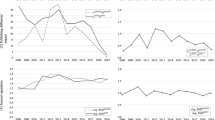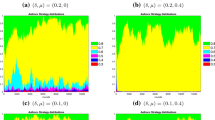Abstract
The aim of peer review is to separate the wheat from the chaff for publication and research funding. In the excessive competition, this mechanism would only select the wheat of mainstream. Up to now, almost all discussions on the consequence of the short-comings of peer review are limited to qualitatively description. I propose a model of “peer-group-assessed-grant-based-funding-system” combined with tenure system and over-competitive research funding review process. It is the first on the quantitatively investigation which dramatizes the current short-comings of the process. My simulation shows that it takes about two or three generations of researchers for the mainstream of a complicated research topic obtaining monopoly supremacy, with only the aid of the mechanism the model described. Based on the computation results, suggestions are proposed to avoid loss of self-correction capability on popularity determined single research direction which could be wrong on very complicated research topics.




Similar content being viewed by others
Notes
Private communication.
References
Alberts, B., Hanson, B., & Kelner, K. L. (2008). Reviewing peer review. Science, 321, 15.
Berezin, A. A. (2001). Discouragement of innovation by overcompetitive research funding. Interdisciplinary Science Reviews, 26, 97–102.
Claveria, L. E., Guallar, E., Cami, J., Conde, J., Pastor, R., Ricoy, J. R., et al. (2000). Does peer review predict the performance of research projects in health sciences? Scientometrics, 47, 11–23.
Grivell, L. (2006). Through a glass darkly—the present and the future of editorial peer review. EMBO Reports, 7, 567–570.
Gura, T. (2002). Peer review, unmasked. Nature, 416, 258–260.
Horrobin, D. F. (1996). Peer review of grant applications: A harbinger of mediocrity in clinical research. Lancet, 348, 1293–1295.
Jayasinghe, U. W., Marsh, H. W., & Bond, N. (2001). Peer review in the funding of research in higher education: The Australian experience. Educational Evaluation and Policy Analysis, 23, 343–364.
Lawrence, P. A. (2003). The politics of publication. Nature, 422, 259–261.
Lerner, E. (2004). Bucking the big bang. New Scientist, 2448, 20.
Neylon, C. (2009). Funding ban could break careers at the toss of a coin. Nature, 459, 641.
Perrin, W. F. (2008). In search of peer reviewers. Science, 319, 32.
Plerou, V., Amaral, L. A. N., Gopikrishnan, P., Meyer, M., & Stanley, H. E. (1999). Similarities between the growth dynamics of university research and of competitive economic activities. Nature, 400, 433–437.
Rocha, B. (2001). Trouble with peer review. Nature Immunology, 2, 277.
Scarpa, T. (2006). Peer review at NIH. Science, 311, 41.
Smith, R. (1997). Peer review: Reform or revolution? British Medical Journal, 315, 759–760.
Spier, R. E. (2002a). The history of the peer-review process. Trends in Biotechnology, 20, 357–358.
Spier, R. E. (2002b). Peer review and innovation. Science and Engineering Ethics, 8, 99–108.
Spier, R. E., & Bird, S. J. (2003). On the management of funding of research in science and engineering. Science and Engineering Ethics, 9, 298–300.
Zucker, R. S. (2008). A peer review how-to. Science, 319, 32.
Acknowledgment
I am grateful to Dr. W. Z. Wang (University of Wisconsin-Milwaukee, USA) for helpful discussions. This work was supported by the National Basic Research Program of China under Grant 2011CBA00107.
Author information
Authors and Affiliations
Corresponding author
Rights and permissions
About this article
Cite this article
Fang, H. Peer review and over-competitive research funding fostering mainstream opinion to monopoly. Scientometrics 87, 293–301 (2011). https://doi.org/10.1007/s11192-010-0323-4
Received:
Published:
Issue Date:
DOI: https://doi.org/10.1007/s11192-010-0323-4




